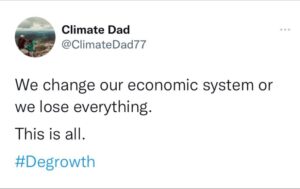
Demonstrating “all” is difficult. Most of the time, the climate doesn’t follow our dire predictions. The date arrives and the apocalypse doesn’t happen.
This is why so many movies (2012, The Day After Tomorrow) depict two things
1. The disruption is happening faster than predicted.
2. It’s happening to nice, educated, relatable white people, not to strangers far from us.
Hence drama ensues. But this is a movie, right?
The reality is that it will be slightly slower than predictions but it will be uneven. Entire regions populated by people who don’t look like you will be devastated by floods or hurricanes. Meanwhile you’ll complain that the summer was a bit rubbish (or in sailing circles that the westerlies and trade winds patterns are changing).
The locations hit worst will be places that you like to go on holiday or regions which make your products cheaply.
But it doesn’t have to be like this.
Providing developing countries with modern technology (such as solar) in sufficient quantities could change them from being a carbon-producing economy into a carbon neutral economy. The impact of that alone could be massive – China already has realised that their rapid industrialisation has had a negative impact and they’re taking steps to produce more solar every year than most countries will ever install in a lifetime.
We have the technology to create a future-proofed 22nd Century civilisation. But like climate disruption, it is applied unevenly.
The negatives of globalisation can be turned into positives if we remember that we all live on the same sphere (the pale blue dot) and that what happens in London or Mumbai or Durban will have an effect on lives in Shenzhen, Helsinki and Melbourne.
Remember this when someone asks you where you’re from.
You’re from Earth